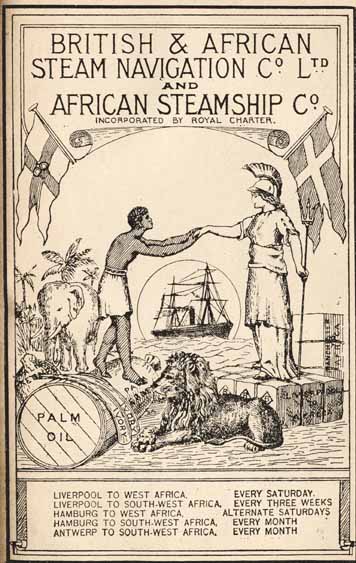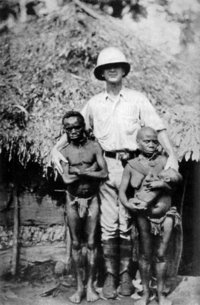Here is a (hopefully-not-too-boring) character sketch of Ekwefi, the leading female in Achebe's novel...
Through the thoughts of the Commissioner at the end of the novel, Achebe illustrates how Euro-centric views of Africa reduce the complex life of its people to mere sketches of humanity. While Okonkwo is described by one of his own people as “one of the greatest men in Umuofia,” the Commissioner defines him only as a “man who had killed a messenger and hanged himself” (208). In response to reductive, insidious, and destructive Euro-views of African nations and their people, Achebe assigns incredible depth to his characters with minimal narrative. To me, the character of Okonkwo’s second wife, Ekwefi, is full of complexities. Although I am a white female living in an American post-modern world, and may lack much cultural capital that would most likely deepen my appreciation of her, I find Ekwefi’s character full of subtleties. She is not simple by any means.
To me, Ekwefi represents strength and courage as seen through the hardships she bears in clan life, and through the complex connections and choices of living within a society’s rituals, traditions, gender roles and laws. Although Ekwefi does not appear much in the second and third part of the novel except for preparing the feast to leave Mbanta, she and her daughter (who is portrayed to be so much like her) are strong characters and given more importance than other females in the novel, illustrating a less common patriarchal characterization of African society. Okonkwo’s first wife is always referred to as “Okonkwo’s first wife” or as “Nwoye’s mother” (40). “Of his three wives Ekwefi was the only one who would have the audacity to bang on [Okonkwo’s] door” (76). She has her own mind and does not always obey the rules of gender.
Ekwefi defies the traditional marriage ceremony by leaving her first husband “two years after her marriage” because “she could bear it no longer and…ran away to Okonkwo” who she fell in love with after watching his wrestling match (39). We might assume there was no bride-price or marriage ceremony, which meant that Okonkwo felt equally strong towards Ekwefi. But because Achebe does not inform us of the details of this situation, and there is no mention of any consequence, we might assume that “justified divorce” is a pardonable course of action in this society.
While we see Okonkwo as a character who displays a strong, hard, unemotional outer self hiding an inner more emotional side, we might see Ekwefi as his opposite; her emotions plainly displayed while at the same time strong enough to survive what might easily destroy others. Losing one child for many mothers would be enough to defeat them, but Ekwefi, who has “suffered a great deal in her time” (40) losing nine out of the ten children she bore, finds the strength to continue. Achebe allows the reader insight into her strength by describing the complex emotional and mental states of despair, resignation and bitterness that she passes through during this time of loss. These are all understandable emotions. Adding that “her bitterness did not flow outwards to others but inwards into her own soul; that she did not blame others for their good fortune but her own evil chi” (79) shows a depth of feeling in her character that connects her to tradition and responsibility.
For the most part, Ekwefi is motivated by the beliefs and traditions of her clan, but never seems to accept them passively. When Ezinma has lived longer than her other children, Ekwefi “believed deep inside her that Ezinma had come to stay. She believed because it was that faith alone that gave her own life any kind of meaning” (80). Her strength comes from this traditional belief that her god, her “chi,” will allow Ezinma to survive. When Ekwefi finally is assured of this after they find Enzima’s “iyi-uwa,” she allows herself to feel love again, but cannot relax. Ezinma is “the center of her mother’s world”…and Ekwefi has “put all her being into” taking care of her (79). The deaths of her previous children and her devotion to her only surviving child have engraved a mental and emotional state of constant anxiety and fear for Ezinma’s survival. Ekwefi cannot be completely assured that her “chi” will not take Ezinma. This fear and anxiety seems to motivate much of her actions.
Although Ekwefi does adhere to the traditional female role in this society by being part of a family with multiple wives expected to produce offspring and attend to those typical duties, in many further respects she does not comply with the traditional female gender role. Achebe describes her relationship with her daughter as both mother and contemporary: “Ezinma did not call her mother Nue like all children…the relationship between them was not only that of mother and child. There was something in it like the companionship of equals” (76). This is a multi-dimensional mother/daughter relationship that defies stereotype. In addition, Ekwefi questions the authority of the clan, Okonkwo, Chielo and the gods when she decides to follow Chielo who takes Ezinma into the forest. Chielo warns her not to go: “How dare you, woman, to go before the mighty Agbala of your own accord? Beware…lest he strike you in his anger” (101). But she does not heed this danger to herself and defies even an angry god who could kill her. Okonkwo does not stop her when she declares, “I am following Chielo” (103), which implies her own authority with Okonkwo and in the family. Nor is she punished for this, which Achebe may have utilized to indicate that questioning authority is allowed in this society. She does not think to ask for help from Okonkwo and takes on the responsibility of Ezinma alone. This action of Ekwefi, who is already constantly filled with fear and anxiety, shows immense strength and courage. She not only fears for her daughter’s safety, but she goes into a forest she believes to be filled with “evil essences…She would wait at the mouth, all alone in that fearful place. She thought of all the terrors of the night” (104). This certainly demonstrates determination, devotion, strength, defiance and courage. Ekwefi is ultimately a survivor, stronger than Okonkwo, who chooses death rather than fight for survival in the end.
Subscribe to:
Post Comments (Atom)





5 comments:
Wendy,
First, allow me a few seconds to sit in a corner and squeal excitedly at the proverb on your page. I love it!
I am so glad you discussed Ekwefi since her daughter seems to be praised more frequently by Okonkwo. Okonkwo and Ekwefi seem to have quite the love story, yes. Like you, I have no idea whether her running away from her first husband was too rebellious in the scheme of things in her clan. Nevertheless, it is an admirable act of courage for her to follow her heart when she could lose everything she had. Okonkwo seems to be harsh on her but supports her when needed. The night when their daughter was taken by the priestess, for instance, he follows Ekwefi to the cave and then stays with her while they waited for their daughter. It is interesting that you mention the similarity between Ekwefi and her daughter. I never considered this at all, but it seems to make sense now that I think of it. They are both very strong and do tend to break away from some of the traditional gender roles in their society.
See you in class!
Great essay! I agree with you on all counts!
I find the relationship between Ekwefi and Okonkwo to be particularly interesting. I think that despite his frustrations with Ekwefi (almost shooting her in the barn, for example), Okonkwo respects and maybe even favors Ekwefi (though I don’t think that’s ever explicitly stated) because of her strength and independent mind (though he would never admit that outwardly). I think that’s why he’s particularly concerned when Ekwefi follows the priestess into the hills and why he follows her to make sure she’s OK. He likes her for the same reasons he likes Ezinma. They are similarly strong women.
I like what you said, too, about Ekwefi’s anxiety over losing Ezinma. I completely agree that because Ezinma is her whole life and because she has lost all of her other children, Ekwefi lives in constant fear of losing Ezinma. I think it’s also why she spoils Ezinma. She wants and needs Ezinma’s love. Also I think it’s why they are friends, as well as mother/daughter. Ekwefi needs that emotional connection.
Hey Wendy,
It was really interesting reading on Ekwefi just because there isn't too much to her in the story yet you pulled out so much. I think the most significant aspect of it all is the underlying power the women have in this story. For example,we start with Chielo who is the priestess and what she says pretty much goes all the time. Then there is Ekwefi who you talk about and her power as a wife, especially due to the fact that she ran away from her husband to be with Okonkwo. There is also Ezinma, her only surviving daughter, who she tends to with so much care, and this is the same for Okonkwo. I think that the significance of the women and their power in the story fluctuate as they get beaten at times, and other times placed at higher authoritative positions (Chielo),then taken care of by their husbands (Okonkwo and Ekwefi). I'm assuming we'll get to the bottom of the women role and power towards the end of the book, so with that happy reading and great essay.
Truly an independent, feminist character, Ekwefi, was very interested to follow on this
journey Achebe led us through. As the second wife, she far overshadowed the first wife.
The responsibilities, freedom and respect that Okonkwo gave/showed to Ekwefi were like
neon lights flashing in a dark room. She was unafraid to stand her ground and show her
true emotions to him from the very start - as you mention, when she runs from her first
husband’s home to Okonkwo’s bed and becomes his second wife. Life for Ekwefi was
very hard – she had survived a great deal with the loss of so many children before
Ezinma, but Achebe I believe, made her this strong to be able to endure the years and
transitions she must later endure, with a man as tough as Okonkwo – few if any other
women could gain and maintain his respect, much less me able to tolerate the years and
tears that went with that, and still be able to be the woman who raised the favorite
daughter (that should have been a boy).
Hello. Your post was very uplifting and relatable. As a woman I found myself intrigued by Ekwefi as well. Although she is African she represents modern woman everywhere. Being Mexican I can understand Ekwefi’s actions to rebel against her customs. I wasn’t raised in the typical, traditional Catholic, Mexican home. However several of my cousins and friends were. I hear their stories about how their mothers stay home while their fathers enjoy life. They have girlfriends, go out with their friends, and do whatever they please. Like Professor Barnad stated, “all because they’re traditions doesn’t make them right". Like many cultures woman remain in the shadows unless those women are ready to step up to their oppressors. Ekwefi is a woman who knows what she wants and has no limits to gain them, as seen when she leaves her husband to go to Okonkwo. She does represent strength and modernism. Like Ekwefi I do recognize the customs of Mexicans; however I don’t fully accept them. In no why means is a feminist approach, but more of an individual approach. Like Ekwefi she wants to live not as a woman but as a person.
Post a Comment